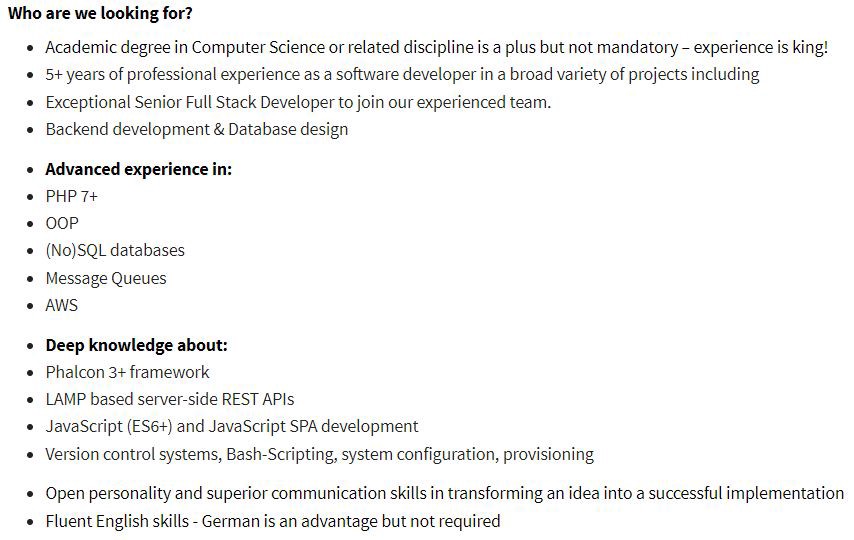How to create a CV that gets you hired in Europe
25 tips and tricks (start with one of our templates)
Getting the job — it starts with a good CV.
Your CV is the most important part of your application package. LinkedIn profile, Github, and your own website all matter as well, but a bad CV is hard to recover from.
Why? Recruiters first look at your CV to assess your application. They score your CV using a set of criteria. It’s like Bingo. The higher your score, the better your chance to land a phone interview. Bingo.
What makes a great CV?
For the engineers among us: a great CV is a function of two variables
- First, match. “Match” is an increasing function of the number of keywords scored right on your CV
- Second, simplicity. “Simplicity” is a decreasing function of the time a recruiter takes to score your CV.
Let’s take a look at these, one by one.
Magic factor 1: Match.
Maximize relevant keywords. Recently a firm in our network was looking for a Senior PHP engineer. See their post below.
A recent job post at a startup in Berlin/Germany.
Guess what their main criteria for the screening are: 5 years of work experience. PHP 7.X, OOP, SQL, Message Queues, and AWS experience. Other criteria also seem important: Phalcon, REST APIs, JavaScript, and version control systems.
Does this mean that you should sprinkle your CV with all these keywords? No. Instead, use these lists as a guide as to whether an application even makes sense.
Too often we see people 'apply first, think later'. This tactic is known as “spray and pray”, sending the same CV out to 50 firms and hoping for the best. Don’t do that. The rejections will hurt your brand, and also your ego.
Pro tip: Test the fit of your CV to the job description by using this free tool.
We stress this point so much because the best way to get rejected for a job is to apply for the wrong job. It’s that simple.
What is the “right” job for you? As a rule of thumb, only apply if you can credibly make the case that you check ~75% of the criteria listed. You get a check if you have done real work in a topic/language/framework. This is more than just an active interest.
Example: Let’s assume you are a PHP developer with a broad full-stack, four years of work experience, and no German skills. Should you apply for the job above?
Yes, by all means. No firm will ever pass on you if you only have 4 but not the required 5 years of experience. But prepare to make a case about why you are ready now. Also, German skills are explicitly listed as optional, which is a good sign that people who don’t speak German are invited to apply.
Magic factor 2: Simplicity.
Help a recruiter read your CV. If your objective is to craft a customized CV that is easily readable for recruiters, then your CV needs to have a functional layout.
A great CV does not have to be beautiful. It needs to be clearly structured and well-readable.
PRO TIP: Take any standard US or European CV template and adapt it to your persona. It’s easy. Here are your options:
- Use the decent built-in CV templates in Google Docs
- Use a free CV builder, such as this one here for English CVs in a standard US/EU format, or this simple one here, or this one here for German CVs.
- Take a look at our collection of winning CVs. These are real CVs that won people tech jobs in Germany. Ignore at your own risk.
Want to see a great CV? → Here is one, and here is another — ready for you to use as a template. You’re welcome.
A well-structured CV allows your recruiter to scan and score it in less than 5 minutes. Amr, a product manager in our network, calls a CV your personal “clickbait”. All your CV needs to do is to compel a recruiter into action.
Here’s a list of 25 CV do’s, don’ts, and absolute no-go’s
10 Do’s:
- Put your name and contact details on top of every page
- Use a decent email address (no [email protected])
- Have a concise summary — your one-liner. A good one-liner has less than 15 words and answers who you are
- Clearly describe your position and your responsibilities. Always use the same format. Example: Company name, position, and then 3 sub-bullet points of your key tasks & achievements. This is absolutely crucial.
- Add a section on awards & extracurricular activities. Recruiters always look for something special, unique. Organizing meetups? Doing side projects? Doing freelance work for European clients? Writing a blog that has some audience? Put it here.
- Add a comment to your university if it’s an EU Blue Card-eligible school and degree. Add a further note if you graduated among the top of your class or received some award of distinction. Add a final note if your school is in top10 of the country
- List your language skills, especially English and/or German (if you have the latter)
- Add a link to your github profile. A good github has at least one, ideally more, own projects (not just forked). For details see here.
- Make your CV machine-readable (via OCR). Some firms now use software to search CVs for keywords. An image is not OCR searchable.
- [Optional] Add up to 3 relatable hobbies. Example: Climbing. It shows a certain teaming ability and affinity for the tech world. Boxing? Not so much.
5 Dont’s:
- Adding stuff that is not customary in Germany: photos, religion, military status. But feel free to put “married, 2 kids” (if that is the case for you!)
- Listing all languages, frameworks, concepts you have ever worked with. Recruiters need to quickly score and categorize you. Help them do that.
- Including irrelevant detail. Example: Congrats on your certificate for data cleaning from Udacity in 2015. But delete it. It likely weakens your CV. Instead, wait for the phone interview. There, drop the fact that you spend some of your weekends learning online
- Having unexplained time gaps between jobs or overlaps between full-time jobs. It lowers your credibility with German recruiters.
- Resorting to grandiose self-declarations: “I am an excellent problem solver with proven ability to execute.” Don’t do that. Instead, tell that story using the 3 bullets describing your main tasks and achievements for every job you had
10 No-go’s.
Nobody will trust you to do a good job if you cannot put together a decently crafted CV. Here is a list of absolute basics to follow:
- Use one font type
- Use one font size, or two (e.g. bigger headlines)
- Align text boxes: no random jumps
- Make no English errors: “softwear”
- Make no grammar errors: “is Java engineer”
- Use the right articles: “I am a Java engineer” (the a is often omitted)
- Make no punctuation errors: “… done that ., Now I do x…”
- Reverse chronological structure: Current job first
- Use one spelling of your name in English, not two or three (we have seen a lot…)
- Two pages max, one page strongly preferred
Some of these may appear to you as “very narrow-minded” or “too German”. We feel with you. But believe us, it’s still very important. To avoid most of these things, use a CV generator and follow this PRO TIP:
Need a ‘cheat’ for your English grammar, spelling, and punctuation? Install the Grammarly Chrome extension. We also use it. It works like a charm, and it’s free → https://app.grammarly.com/
Summing up
A winning CV is a function of match and simplicity. You need to have both — one of them is not enough. For the geeks among us: a winning CV is a multiplicative function, not an additive one. :)
That’s it. We hope you enjoyed the read. Now it’s time for action. As always, we are rooting for you. Keep us posted.
— Your friends at Imagine
© 2018-2022 Imagine Foundation e.V. Made with 🤍 in Berlin.


